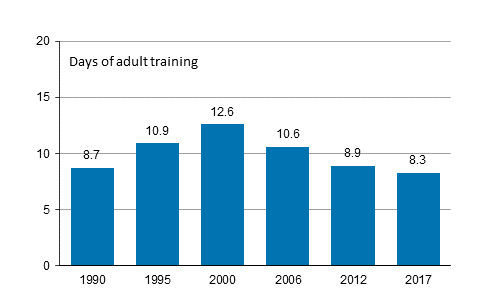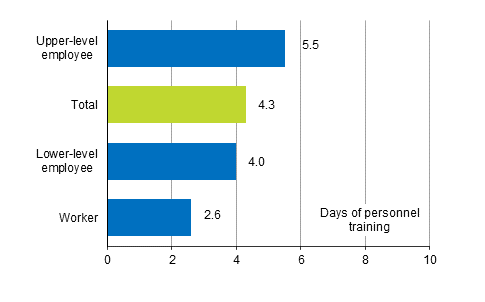Published: 9 May 2018
Number of adult education days has fallen
The number of adult education days received by a person has fallen slightly over the past five years. The amount of employer-sponsored training also decreased. This information derives from the data of Statistics Finland's Adult Education Survey for 2017.
Number of days of adult education per person in 1990, 1995, 1990, 1995, 2000, 2006, 2012 and 2017 (population aged 18-64)

Days of adult education have fallen all through this millennium. At the beginning of the millennium, the number of training days was still 13 days per person. After this, the figure has dropped by one to two training days between each survey. Surveys have been conducted since 1990 at intervals of around five years.
When a Finn aged 18 to 64 spent an average of nearly nine days in adult education in 2012, the number of training days had dropped by around half a day, to good eight days in 2017. The fall was due to a decrease in the participation rate in adult education. Five years ago, the participation rate (52%) was four percentage points higher than in 2017 (48%). In contrast, a Finn aged 18 to 64 having participated in adult education in the year in question spent an equally long time in education in both survey years, that is, around 17 training days.
Women attended adult education more than men in 2017. When women spent 10 days in training, on average, men’s average number of training days was three days lower, seven days. Examined by age, those aged 18 to 44 spent most time in adult education, 11 to 12 days, on average. The number of training days was considerably lower for those older than them, persons aged 45 to 64, three to five days.
A slight fall also in the amount of employer-sponsored training
A Finnish wage or salary earner aged 18 to 64 spent an average of good four days in personnel training partly or fully subsidised by the employer in 2017. The number of training days has fallen slightly from 2012. Then training was received five days a year, on average.
On average, men and women received personnel training equally much. For both sexes the number of training days was good four in 2017. A person’s socio-economic group has more effect on the number of training days received than sex. A wage or salary earner aged 18 to 64 belonging to the socio-economic group of upper-level employees received employer-subsidised training over double, on average, compared to a wage or salary earner belonging to the socio-economic group of workers.
Number of days of personnel training per wage and salary earner by socio-economic group in 2017 (wage and salary earners aged 18 to 64)

Persons aged 18 to 35, those with tertiary level degrees, those working in the central government sector and those living in urban municipalities received more personnel training than average.
An average of one day was studied in adult education and training not related to work or occupation
In 2017, Finns aged 18 to 64 were studying good one day, on average, in hobby or general education oriented training. This is clearly less than five years earlier. In 2012, the number of training days per person was nearly three days.
Women studied more in hobby or general education oriented training than men. The expected value of women's training days was nearly two days, men’s close on one day. Persons aged 25 to 44 and those living in urban municipalities also had more training days than average in adult education and training not related to work or occupation.
In examining the number of training days, an imputed expected value of training days is used for the whole population, which is derived by multiplying the average of training days of those having participated in training by the participation probability.
Source: Participation in adult education 2017, Statistics Finland
Inquiries: Timo Ruuskanen 029 551 3620, Helena Niemi 029 551 2488, aet.statistics@stat.fi
Director in charge: Jari Tarkoma
Publication in pdf-format (212.1 kB)
- Tables
-
Tables in databases
Pick the data you need into tables, view the data as graphs, or download the data for your use.
Appendix tables
Updated 9.5.2018
Official Statistics of Finland (OSF):
Participation in adult education [e-publication].
ISSN=2489-6926. Duration of education 2017. Helsinki: Statistics Finland [referred: 21.2.2026].
Access method: http://stat.fi/til/aku/2017/02/aku_2017_02_2018-05-09_tie_001_en.html

